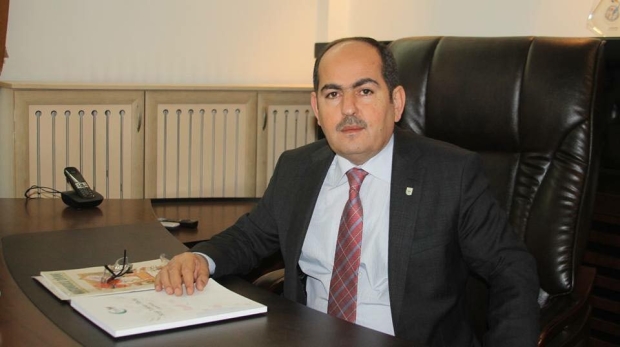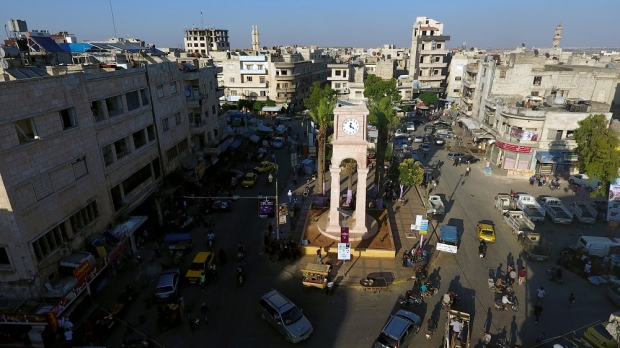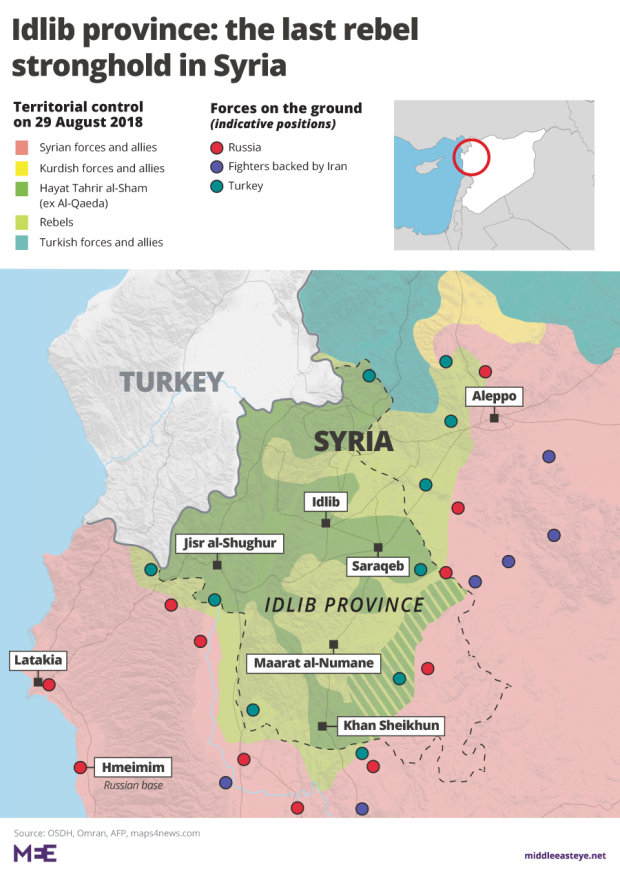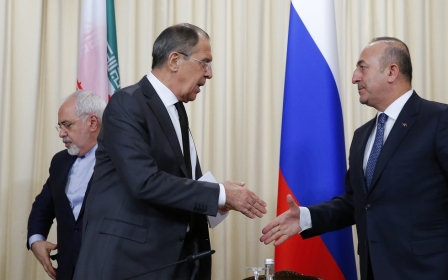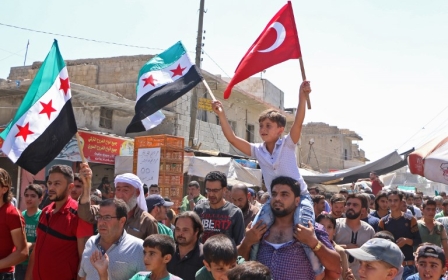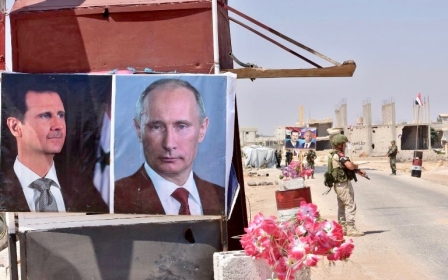Syrian opposition says it will resist assault on Idlib province
ISTANBUL, Turkey - The head of the Syrian opposition said rebel forces would not withdraw from Idlib if the Russian and Syrian governments launch an assault on the province, even if they failed to eliminate "terror groups" within their ranks.
In the wake of an anticipated attack on Idlib, Turkey has been working with rebel leaders to isolate the former al-Qaeda affiliate Hay'at Tahrir al-Sham (HTS) from other rebel groups in the province to prevent a potential massacre and yet another massive influx of refugees.
The head of the Istanbul-based Syrian National Coalition (SNC), Abdulrahman Mustafa, told Middle East Eye that opposition groups in Idlib were trying to entice members of HTS - which is officially a coalition, although dominated by former al-Qaeda fighters - to leave the organisation.
“We are trying to have all the groups in the HTS to shift to the National Front for Liberation (NFL) and dissolve HTS. We will see what will happen next," he said. The NFL is an umbrella group of rebel forces backed by Turkey.
Mustafa, who was elected head of the SNC in May, said that the emergence of "terror" groups in Syria had undermined the uprising launched in 2011 and provided Bashar al-Assad an excuse to paint all rebel forces as terrorists.
"We have only lost since these terror groups emerged, and Assad has always been the winner thanks to terror groups," he explained.
Russia accuses HTS and other “terrorist groups” in Idlib of attacking the Syrian army and Russia’s Hmeimim air base in neighbouring Latakia.
According to the RIA news agency, Russian Foreign Minister Sergei Lavrov said on Monday that it was not possible to tolerate the situation in Idlib indefinitely, and that Assad and Russia have the right to fight against the groups threatening them.
Abu Mohammed al-Jolani, leader of HTS, has publicly warned rebel groups against relying on Turkish mediation.
In a video on Facebook on 21 August he said "the weapons of the revolution and jihad ... are a red line on which concessions are unacceptable, and they will never be put on the negotiation table," and warned the rebels in Idlib “not to rely on Turkey’s monitoring posts because the political positions may change at any moment.”
Two days later, three journalists of TRT World, Turkey’s public broadcaster, were captured by HTS and held for two days. One of them told Middle East Eye that they were put in HTS prisons in Idlib, along with members of the rival Islamic State group.
They were rescued after long negotiations with Turkey’s intelligence on the ground.
Opposition ready to fight
Although Mustafa expressed a desire to dissolve HTS, he said that if it were not possible to do so, rebel groups would not fight against HTS and would join them in fighting against Russian and government forces.
“We are against all terror groups but when we are all under threat, how can we fight against any other group?" he said.
"Russia says they are waiting for the opposition groups to split from HTS, but we know what it means. It did the same thing in Eastern Ghouta and Aleppo; eventually it forced millions of people to leave home.
"The real aim is not separating them, the aim is to shape the country on its own terms. But this won’t bring stability and peace to Syria,” he added.
Idlib is host to more than 2.5 million civilians, more than half of which were evacuated from Eastern Ghouta and Aleppo, former rebel-held areas that faced widespread government assault. Idlib is now primarily controlled by Turkish-backed opposition groups, most of which are unified under the NFL and HTS.
Ankara has used diplomatic channels with Iran and Russia to gain more time before a summit in Tehran on 7 September. Leaders of Turkey, Iran and Russia will meet for the third time, and this time, Idlib tops the agenda. The three countries are the guarantors of a de-escalation zone in Idlib, where each have established at least 10 monitoring posts.
In a bid to increase diplomatic efforts, Iranian Foreign Minister Javad Zarif was in Ankara on 29 August. Turkish Foreign Minister Mevlut Cavusoglu met with his Russian counterpart, Sergei Lavrov, twice in previous weeks.
A high-level source in Turkey’s defence ministry told reporters in Ankara that they were trying to tell Russia that Idlib was not like the other rebel-held areas which had fallen to government forces in recent years.
“Even in a building you target HTS, you can kill other opposition groups or civilians, it’s really mixed and you can never specify who is hiding where,” he said.
Russia's real aim is not to separate the opposition groups, its aim is to shape the country on its own terms, but this won't bring peace to Syria - Abdulrahman Mustafa, head of SNC
And Zarif, five days after his visit to Ankara, went to Damascus to see his Syrian counterpart, Walid Muallem, on Monday. Muallem said on Sunday that they planned to clear “Idlib of jihadist groups”.
“We don’t want to come across Turkey in Idlib but Turkey should understand that Idlib is Syrian soil. The future of Idlib will be decided during the summit in Tehran,” he added, in his interview with Russia Today.
Following the meeting on Monday, Zarif agreed that militant groups need to be "cleaned out" of Idlib.
"All of Syrian territory must be preserved and all the sects and groups should start the round of reconstruction as one collective and the displaced should return to their families," Zarif said, according to Fars News.
"And the remaining terrorists in the remaining parts of Idlib must be cleaned out and the region should be placed back under the control of the Syrian people."
US President Donald Trump warned the Syrian government on Monday against "recklessly" attacking Idlib.
"President Bashar al-Assad of Syria must not recklessly attack Idlib Province," he wrote on Twitter. "The Russians and Iranians would be making a grave humanitarian mistake to take part in this potential human tragedy. Hundreds of thousands of people could be killed. Don’t let that happen!"
Russia has deployed military vessels to the eastern Mediterranean, where its navy and air forces declared that they were holding joint large-scale naval exercises from 1 to 8 September.
Meanwhile, Assad’s army intensified its artillery shelling on the southern borders of Idlib city, killing a pregnant woman and her daughter.
Russia's air support
Mustafa said the government and its backers shouldn’t cause a disaster and humanitarian crisis because of one militant group in the province.
“But if it happens, the opposition won’t withdraw, it will fight,” he said, adding that there was nowhere else now to withdraw, unlike in Eastern Ghouta and Aleppo.
“The regime’s land operation is coming soon. But the summit in Tehran on 7 September is very important. Maybe Russia won’t support the regime assault with its air forces. If Russia doesn’t conduct an air operation, our forces on the ground, the NFLS, is technically and psychologically ready to fight against the regime. The regime would pay a big price, of course, only if Russia doesn’t support them from the air.
"You know, if Russia conducts air operations, it doesn’t differentiate between the terror groups and others, nor the civilians," he added. "They destroy all the city in around a week, leave nothing behind. We witnessed this in Ghouta and Aleppo."
He said it would be clear on Friday during the summit.
According to a Syrian opposition commander, who spoke to Middle East Eye on condition of anonymity, Russia is prioritising preventing any more attacks on its military airbase in Latakia, and also securing the main roads from Aleppo to the south and to Latakia.In order to do that, Moscow plans to clear the town of Jisr al-Shugour and the villages on the Turkmen Mountain on Turkey’s border of any militant presence.
Should the Syrian army capture the area, it would be in control of the only road into Latakia. At present, Turkey has two monitoring posts in that area and six on the road from Aleppo to Hama.
Mustafa said Idlib should be kept as a de-escalation zone since there was nowhere left to flee.
“They are talking about humanitarian corridors but to where? Idlib was the only place before to open these corridors, but now where will they take those people from Idlib?”
He says Afrin and other Turkish-controlled areas in the northwest took their share in previous evacuations, and they don’t have enough capacity for any more refugees.
Middle East Eye propose une couverture et une analyse indépendantes et incomparables du Moyen-Orient, de l’Afrique du Nord et d’autres régions du monde. Pour en savoir plus sur la reprise de ce contenu et les frais qui s’appliquent, veuillez remplir ce formulaire [en anglais]. Pour en savoir plus sur MEE, cliquez ici [en anglais].


